In today’s competitive online landscape, getting visibility on Google is not just about having great content — it’s also about structuring it in a way that search engines can easily understand. And, it’s no longer only about Google. AI tools such as ChatGPT are starting to take centre stage with people turning to these platforms for quick answers to all their questions.
So, let’s explore how FAQ Schema can help influence search engines and AI to reference or rank your website. Whether you’re using WordPress, Webflow, Shopify, Wix, or Squarespace, implementing this structured data can give your site an instant SEO lift.
what is FAQ schema?
FAQ Schema is a type of structured data (markup, based on JSON-LD format) that you add to your website. (This might sound scary, but with any luck you’ll be able to implement it without too much technical/coding know-how.)
FAQ schema helps Google understand that a section of content on your website is a series of questions, with their related answers.
This markup gives your content the chance to:
- Appear as rich results (with dropdown answers) directly in search results
- Increase your click-through rate (CTR) by standing out
- Provide clearer context to AI models like ChatGPT, Google Gemini, and Perplexity — helping your business get mentioned or quoted more frequently within AI platforms
“Properly marked up FAQ pages may be eligible to have a rich result on Search and an Action on the Google Assistant, which can help your site reach the right users.” – Google Search Console
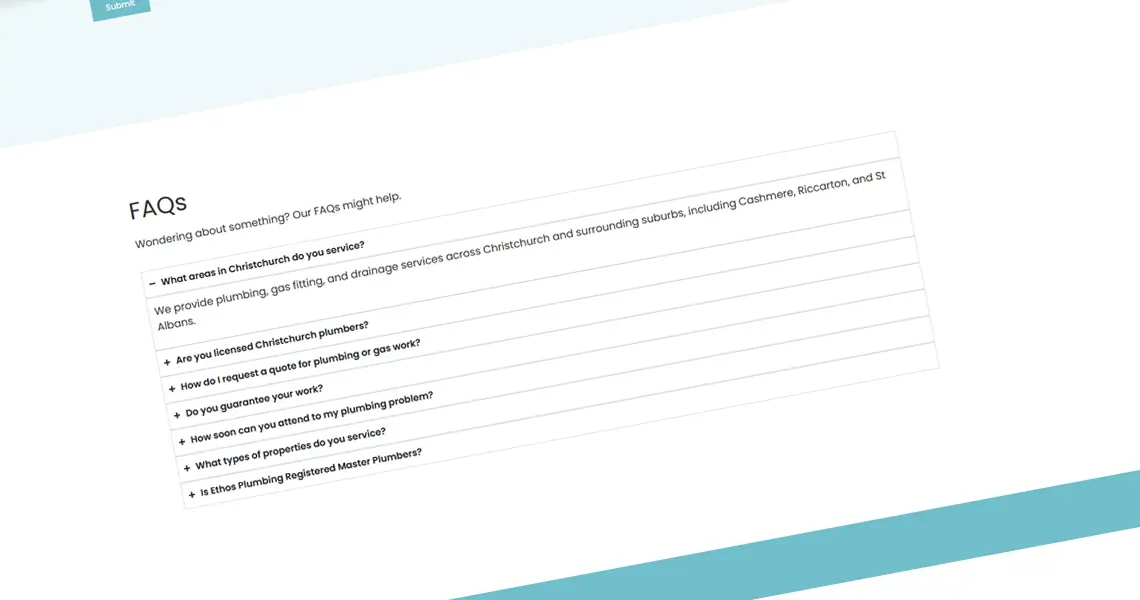
why FAQ schema helps SEO
Adding FAQ Schema to your website can improve it in several ways:
1. Improved Visibility in Search Results
We all want our websites to rank high in search results. But, equally having your result stand out is very beneficial. FAQ-rich snippets make your result take up more space in Google — increasing the chance that someone will click your link over someone else’s.
2. Featured Snippets & Voice Search
Well-structured Q&A content is more likely to be used in featured snippets or voice search answers.
3. AI Mentions & Indexing Support
Platforms like ChatGPT and Gemini crawl structured web data to improve the accuracy of their results. With so many people now turning to AI for answers, marking up your FAQs makes it easier for them to understand, recommend and reference your website.
4. Reduced Bounce Rate
Helping our users find answers to their questions quickly and easily is one of the main goals for a clear, well designed website. Having relevant FAQs on all your pages and/or products will build trust with your users, and help them to find answers quicker, so they stay longer and are more likely to convert.
5. Better User Experience
It shows you care about clarity, transparency, and saving people time.
how to add FAQ schema (by platform)
Ok, so now that we know what FAQs are, let’s get to how we implement it into our websites. Depending on your platform, this can be simple. Otherwise, it may require some custom coding or added plugin support.
WordPress
If your website is built in WordPress, there’s a good chance you already have the right tools available. Editors such as Elementor Pro have a great simple feature where you can simply drag and drop your question/answer element, add your values, and then turn on the FAQ schema.
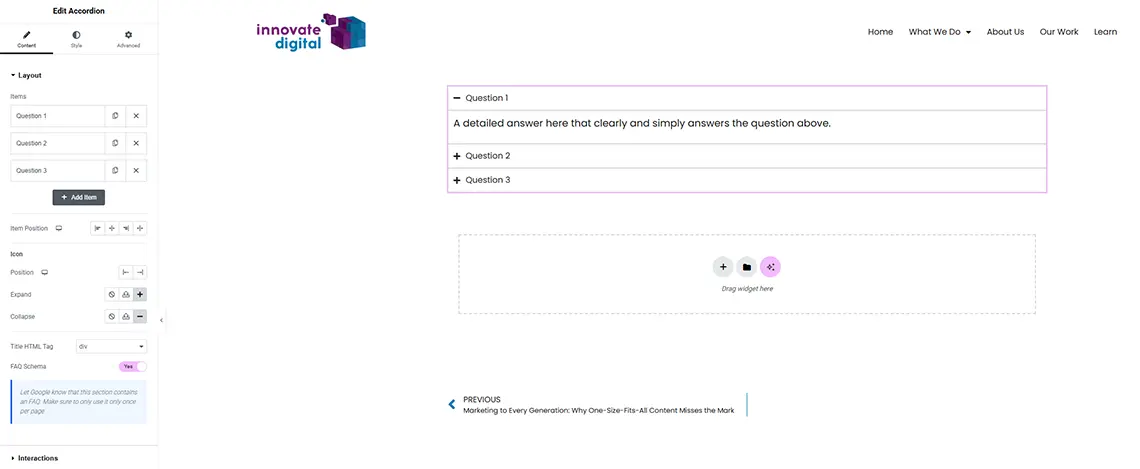
Other plugins like Yoast SEO, SmartCrawl Pro, Rank Math, or Schema Pro offer the ability to let you add custom schema and markup to certain pages on your website. This does take a bit more work and is not as simple or neat as using an editor.
Shopify
At this time, Shopify does not offer very advanced features for website pages out of the box.
You can add JSON-LD code directly into your product or FAQ page templates, but it would be easier to install and use an app such as Smart SEO or JSON-LD for SEO.
Webflow
At this time, Webflow only supports FAQ schema via custom code or third-party attributes rather than a native drag-and-drop block.
Some integrations (like Finsweet Attributes) support dynamic content for FAQs – this app will crawl your Webflow CMS and inject valid FAQ JSON-LD code automatically.
Squarespace
Squarespace also has yet to make this feature native. For now, advanced users can insert JSON-LD into the page header via Code Injection. Or alternatively, embed FAQs via Code Block.
Wix
The most simple option in Wix is to use the free Wix FAQ App. This will give you a collapsible Q&A list and you can easily toggle the FAQ Schema on to automatically create the valid code.
Otherwise, you can manually paste your JSON-LD code into the built-in SEO Tools > Structured Data panel if you prefer.
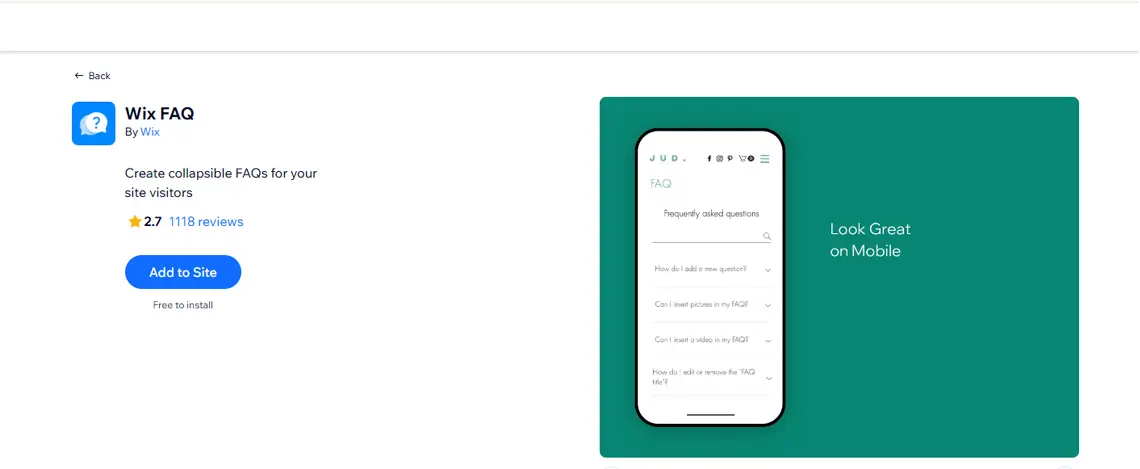
example of FAQ schema markup (JSON-LD)
<script type="application/ld+json">
{
"@context": "https://schema.org",
"@type": "FAQPage",
"mainEntity": [
{
"@type": "Question",
"name": "How does FAQ schema help SEO?",
"acceptedAnswer": {
"@type": "Answer",
"text": "FAQ schema helps your page appear as a rich result in search and makes your answers more visible to AI assistants."
}
},
{
"@type": "Question",
"name": "Where should I add FAQ schema?",
"acceptedAnswer": {
"@type": "Answer",
"text": "Add it to product pages, service pages, or a dedicated FAQ page — anywhere users might have common questions."
}
}
]
}
</script>
how to test your FAQ schema
Google offers two great tools for easily testing if your schema is correct.
1. Rich Results Test
Use this tool to see which rich results Google can generate by the structured data on your page. You can also preview how rich results can look in Google Search.
Find it here: Google Rich Results
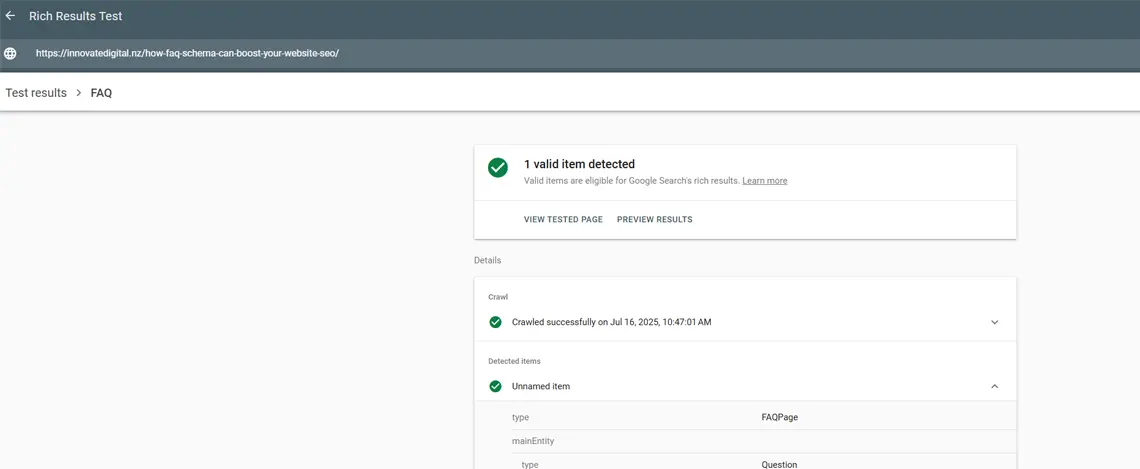
2. Schema Markup Validator
Use this tool to validate any Schema.org-based structured data that’s embedded into your web page. It will show you any Google-specific warnings or errors.
Find it here: Schema Markup Validator
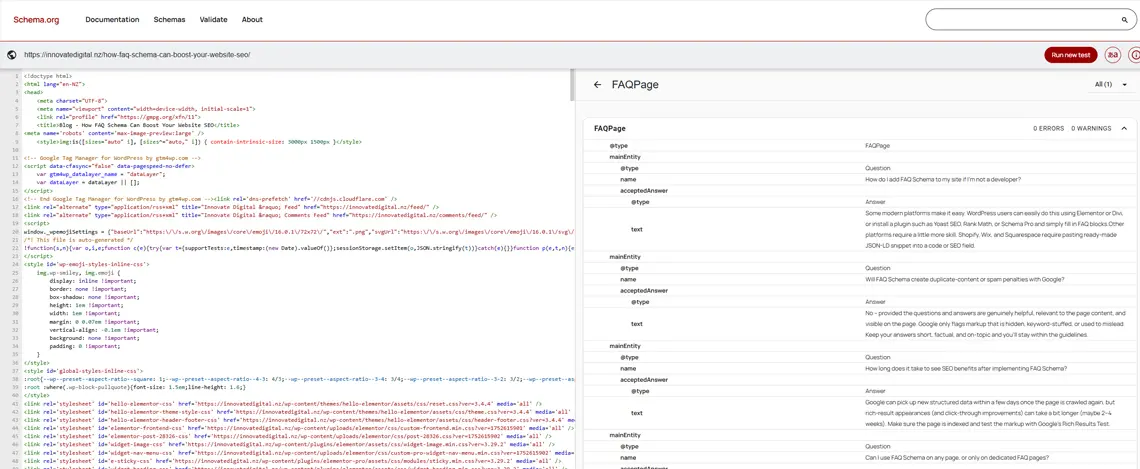
frequently asked questions
How do I add FAQ Schema to my site if I’m not a developer?
Some modern platforms make it easy. WordPress users can easily do this using Elementor or Divi, or install a plugin such as Yoast SEO, Rank Math, or Schema Pro and simply fill in FAQ blocks.
Other platforms require a little more skill. Shopify, Wix, and Squarespace require pasting ready-made JSON-LD snippet into a code or SEO field.
Will FAQ Schema create duplicate-content or spam penalties with Google?
No – provided the questions and answers are genuinely helpful, relevant to the page content, and visible on the page.
Google only flags markup that is hidden, keyword-stuffed, or used to mislead. Keep your answers short, factual, and on-topic and you’ll stay within the guidelines.
How long does it take to see SEO benefits after implementing FAQ Schema?
Google can pick up new structured data within a few days once the page is crawled again, but rich-result appearances (and click-through improvements) can take a bit longer (maybe 2–4 weeks). Make sure the page is indexed and test the markup with Google’s Rich Results Test.
Can I use FAQ Schema on any page, or only on dedicated FAQ pages?
You can mark up any section of a page that legitimately lists common questions and answers. Some ideal places for these are product pages, service pages and blog posts. You might also like to have a generic FAQ page that answers the most commonly Q&A’s for your industry, product or service.
Which plugins or tools are best for adding FAQ Schema on WordPress / Shopify / Wix?
WordPress: Elementor and Divi offer FAQ blocks. Yoast SEO, Rank Math, Schema Pro, SmartCrawl Pro offer more advanced abilities.
Shopify: Use an app such as JSON-LD for SEO or Smart SEO.
Wix: Add the Wix FAQ app to easily add FAQ blocks. Or manually add the JSON-LD under SEO Tools → Structured Data.
Squarespace: Insert JSON-LD in a Code Block or the Page Header injection area.
Webflow: Paste JSON-LD into the custom-code area of the page.
Does FAQ Schema still work now that AI and voice assistants are becoming more popular?
Absolutely. Structured Q&A markup not only helps Google’s rich results, it also makes it easier for AI systems (e.g., ChatGPT, Gemini, Alexa) to identify clear question-and-answer pairs. That increases the chance your content will be cited or read aloud by voice assistants. So FAQ Schema is more relevant and important than ever.
best practices
- Keep your answers short and clear (30–100 words is ideal).
- Be real and authentic. Don’t duplicate content or spam keywords.
- Only mark up actual visible FAQs.
- Review Google’s guidelines to avoid schema penalties.
- Once you have implemented your FAQs, go to Google’s free Schema Markup validator tool and test it is working correctly.
final thoughts
Adding FAQ Schema is one of the most straightforward SEO wins you can make. Not only does it improve your chances of standing out in Google Search, but it also enhances your visibility in AI-generated answers. That means more eyes on your brand — from both humans and bots.
